In this post, we’ll start by explaining the benefits of using Facebook ads in your marketing campaigns. Then we’ll discuss six of the most common reasons Facebook ads fail and some tips for avoiding them. Let’s get started!
The Benefits of Using Facebook Ads in Your Marketing Campaigns
With over 2.7 billion monthly active users worldwide, Facebook is a powerful social media network. It’s also a valuable advertising platform that can help your business, regardless of size and scale, grow your brand awareness, drive traffic, and increase conversions.
There is a wide range of benefits to incorporating Facebook ads into your marketing campaign. Not only is it cost-effective, but it lets you create tailored campaigns for highly targeted audiences.
Some additional benefits of using Facebook ads include:
- There is a lot of flexibility. When creating Facebook ads, you can easily customize them based on the type of ad creative you want to use, the audience you’re targeting, and your marketing budget and goals. You can also create custom Calls To Action (CTA).
- It offers targeting and retargeting tools. Facebook ads can be highly specific, letting you leverage detailed targeting features so you can market to consumers based on their demographics, behaviour, and interests.
- You can track and monitor campaign performance through extensive analytics. Facebook provides analytics that you can use to evaluate ad performance and track key metrics, including weekly reach, post engagement, and page likes.
- Facebook ads are beginner-friendly. Regardless of whether you’re a seasoned or amateur marketer, Facebook offers a variety of advertising options that range from boosting posts for simple promotions to utilizing the Ads Manager for more complex campaigns.
- You can use Facebook ads for nearly any marketing objective. Facebook ads can be used to generate leads, boost conversions, and build brand awareness.
If you’ve tried Facebook ads in the past but weren’t happy with the results, the problem may not be the platform itself. You may just need to adjust your approach.
To be successful, Facebook ads need to be strategically designed and optimised. Unfortunately, it can be easy to make mistakes with these types of ads, especially when you’re first getting started.
6 Reasons Facebook Ads Fail (And How to Avoid Them)
To better understand how to create Facebook ads that drive conversions, it helps to first know what mistakes to avoid. Let’s take a look at six common reasons Facebook ads fail and how you can avoid them.
1. Not Placing Enough Emphasis on Engagement and Click-Through Rate (CTR)
Facebook ads are, generally, a budget-friendly marketing tactic. However, common mistake marketers often make with Facebook ad campaigns is not putting enough emphasis on engagement and Click-Through Rate (CTR), which play a major role in the Cost Per Click (CPC) of campaigns.
The problem is that many people are eager to get their Facebook ad campaigns up and running, but don’t take enough time to make sure they’re properly tracking the right metrics. Then they’re left with no way to analyse the results of their Facebook ads and end up wasting advertising dollars on clicks that didn’t lead to conversions.
A great way to present a relevant ad if you are an e-commerce store is to start with dynamic product ads. You can use dynamic product ads to retarget visitors that have been to your website and browsed products by showing them ads for those exact same products. It’s a perfect match and should help boost your CTR.
You can also use dynamic ads for lead gen as well, it’s a great way to test different headlines and ad copy and let the algorithm do the hard lifting for you by working out the best combinations with the best CTR. The only downside to dynamic ads is that each ad is “dynamic” which means that it’s harder to gather engagement as each ad is unique to the user.
Facebook lets you monitor some helpful insights and analytics such as your ads clicks, and engagements:
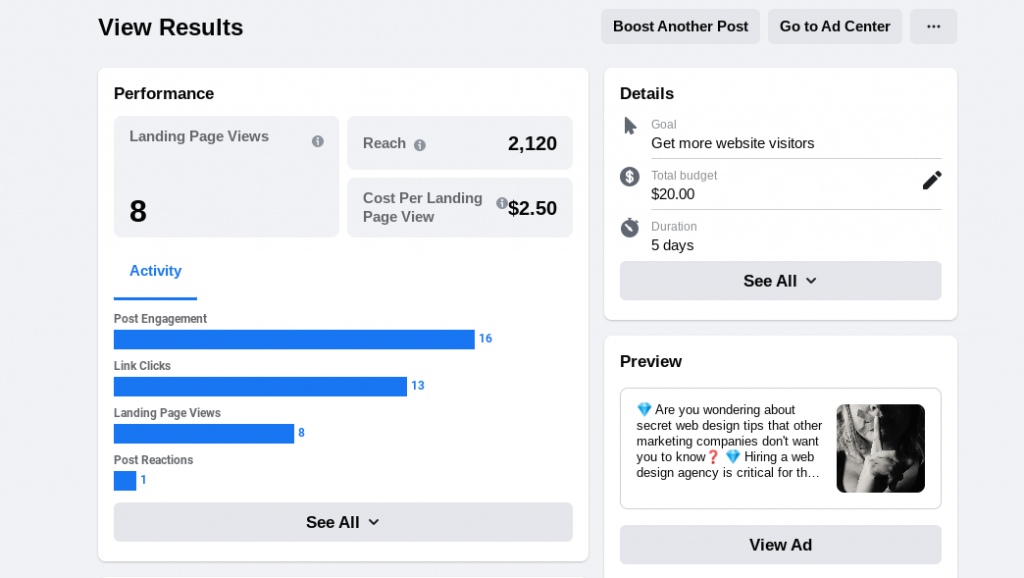
However, to turn this data into meaningful information, you also need proper context.
To track off-platform conversions, you need to set up Facebook Pixel on your website. Additionally, you can use Google Tag Manager to better understand your key data and metrics as well as track specific conversions such as lead generation and sales.
2. The Design of Ads Don’t Match Up With the Customer Journey
Another reason Facebook ads fail is that they aren’t designed in a way that matches up with where the customer is at in their journey. A consumer who’s never heard of your brand is going to respond differently than a customer who is about to checkout. The ads targeting them should be tailored to reflect that.
Keep in mind that Facebook is a low-intent marketing channel. This means that many of the users on the platform are using it for social rather than shopping purposes. Of course, this isn’t to say that Facebook ads won’t lead to purchases. Rather, it’s helpful to keep the various stages of the customer journey in mind when creating your ads.
For example, it’s safe to assume that a consumer seeing an advertisement for your business for the first time on Facebook isn’t ready to buy. Therefore, the initial ad they see should be focused on communicating what your business is about and what you have to offer.
The following ad does an effective job at quickly introducing the business and what they do while encouraging visitors to check out more about them:
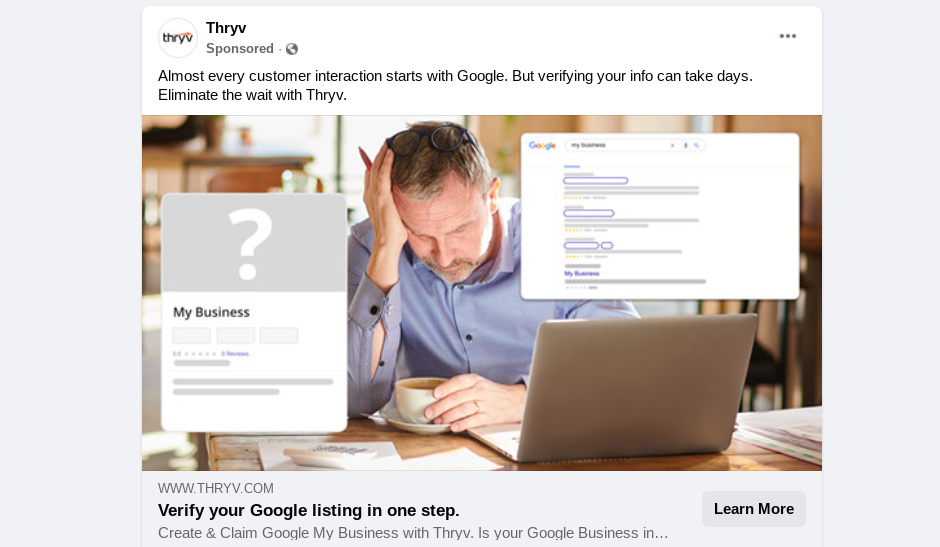
The ad intends to capture the attention and spark interest among customers at the beginning stage of their journey. Subsequent ads targeting returning customers or people already familiar with your brand could be more direct and have a defined CTA, such as SHOP NOW, with a discount code.
3. Failing to Properly Optimise Ads to Grab Audiences’ Attention
Once you’ve established your targeted audiences and the type of ad creatives you want to use, the next step is to design and optimise them. Unfortunately, this part of the process is sometimes overlooked by marketers and, as a result, fails to effectively grab visitors’ attention.
To create Facebook ads that draw attention, it’s important to optimise the ad image and the first two lines of ad copy. These are the things Facebook users will see and, as such, are critical ‘scroll stoppers’ for capturing their interest. If your ad doesn’t stand out, it’s going to be difficult for it to help increase engagement and conversions.
Make sure you’re carefully selecting high-quality images and crafting compelling copy that is both descriptive and relevant to the accompanying image:
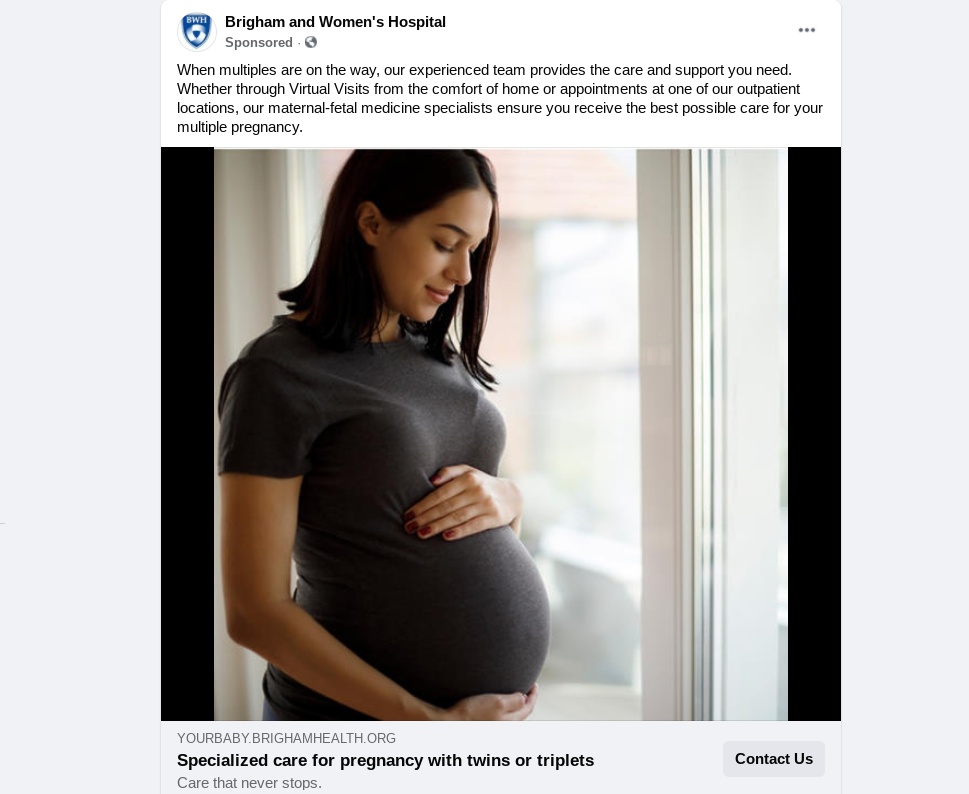
Another tip for optimising your Facebook ads is to test them. For example, you can perform split testing to assess which version of an ad performs better among your audience.
From the image to the copy, it can sometimes be challenging to figure out what customers are most likely to respond to. Conducting tests will help take some of the guesswork out so you can better optimise your ads for the best results.
In the same vein, it’s also important that your Facebook ads match up with your landing pages and that your messaging is consistent. For example, if you create an ad promoting a specific product, the landing page it links to mustn’t be for another product or service. Otherwise, not only is the customer more likely to leave your site, but you’re wasting advertising dollars.
4. Targeting an Audience That Is Too Small or Narrow
As with any type of marketing strategy, it’s important to have a clearly defined audience to target. However, one reason Facebook ad campaigns sometimes fail is that the target audience is too small or narrow.
As we mentioned earlier, Facebook provides an extensive list of detailed targeting features and tools for creating ads. For example, you could create an ad that targets someone who is married, enjoys travelling, and has an anniversary coming up within the next month:
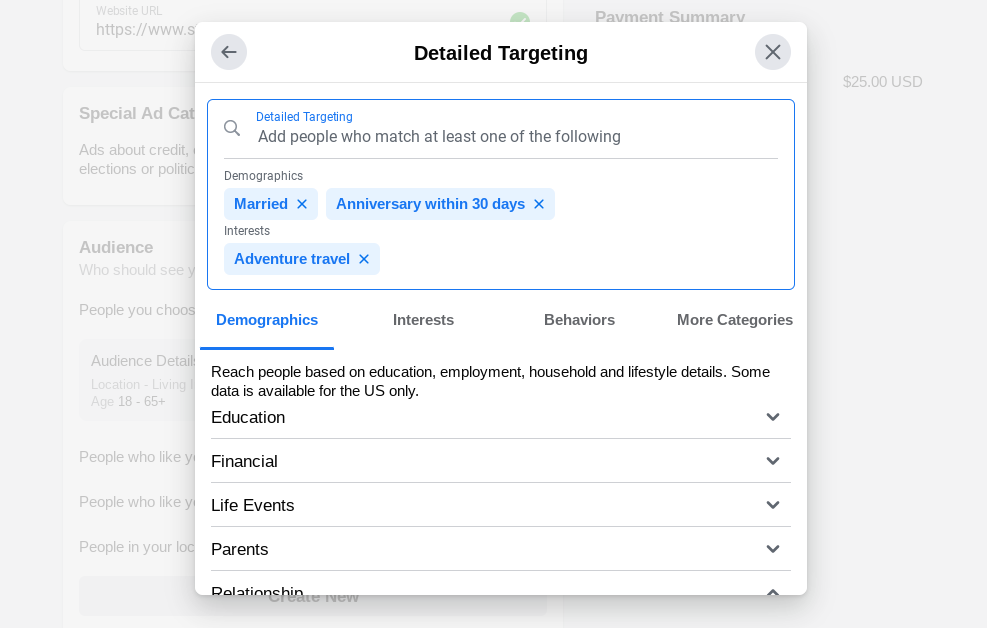
Although you want your ads to be seen by consumers most likely to convert, it’s important that you don’t limit your reach in the process. Facebook is an ideal platform for generating awareness.
However, considering only a small percentage of your defined audience will engage with and respond to one of your ads, you don’t want to get overly specific. Zoning in too precisely on a niche can mean losing clicks or impressions that help to generate leads and expand brand awareness.
This is particularly true if you’re new to Facebook ads and are still testing out different types of ad formats and messaging. In the beginning, it makes more sense to cast a wider net (meaning an audience of more than one million). Then as you learn what your audience responds to, you can further segment and target audiences more narrowly.
5. Failing to Use Long-Form and Story-Driven Ad Copy
When creating ads, a typical mindset is, “How can I grab a user’s attention with as few words as possible?” While concision certainly has its place in marketing campaigns, including Facebook ads, failing to use long-form and storytelling in ad copy can also limit their effectiveness of them.
Facebook offers a wide variety of ad formats to choose from. Incorporating long-form content and story-driven ad copy into your campaigns presents the opportunity to connect with audiences in ways you otherwise wouldn’t be able to. It can help engage and entice users as well as build loyalty and trust:
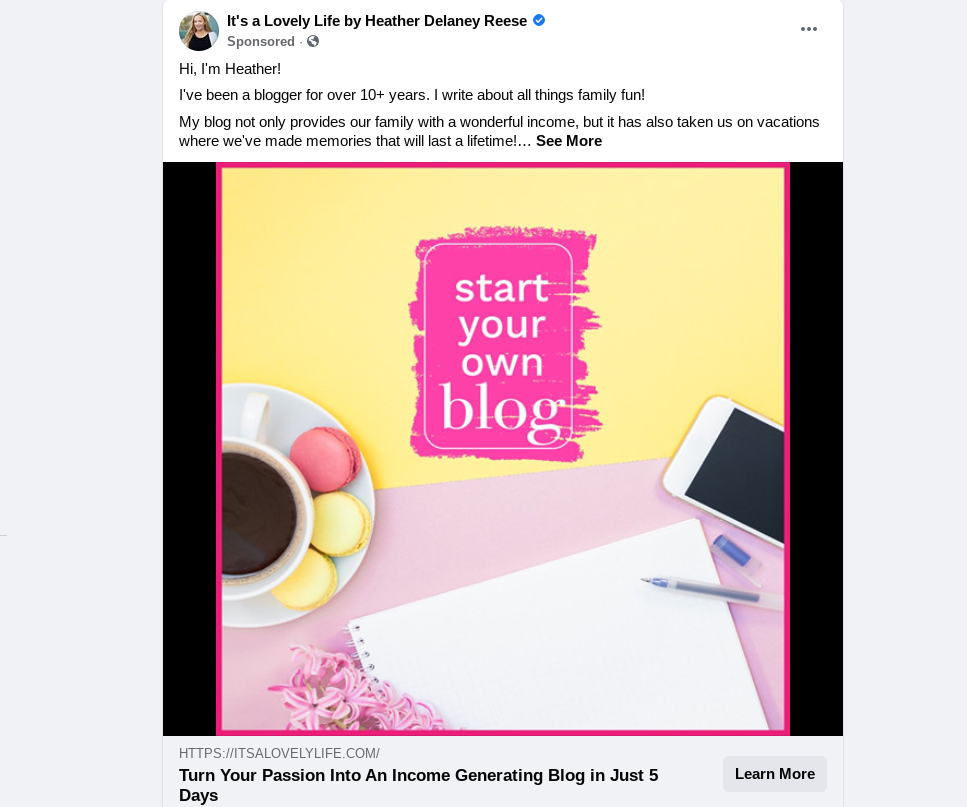
This can be particularly helpful when you’re trying to boost brand awareness and get the word out about your business and offerings. There are also multiple ways you can do this. In addition to the copy, you can also use videos, slideshows, and carousels to tell a story.
Another popular example and use case for story driven ad copy is blog promotion campaigns, where you use the Facebook ad as a sort of introduction to spark interest. For these types of posts, longer ad text can help grab users’ attention and keep them engaged long enough to entice them to want to learn more.
6. Not Having Patience With Facebook’s Learning Algorithm
When you first get started with Facebook ads, it can be easy to get ahead of yourself. You’re eager to get your campaign started and begin promoting content to your audience to drive traffic and conversions.
However, successful marketing campaigns don’t happen overnight. This is especially true when you’re dealing with a powerhouse platform such as Facebook that uses complex and sophisticated algorithms to target consumers.
Another reason Facebook ads sometimes fail is that marketers call it quits without allowing the Facebook algorithm to complete and exit its learning phase. This means it isn’t able to achieve the required number of conversion events within the fixed period to drive meaningful results.
There are a variety of reasons your Facebook ad campaigns may be slow to take off. For example, perhaps you’re using ineffective ad copy and images that don’t capture attention or they’re not relevant to the audience that you’re targeting.
Whatever the reason, it’s essential to be patient before making any drastic or sudden changes. Just because you’re not seeing immediate results doesn’t necessarily mean your campaign is ineffective.
Facebook requires a minimum of 24 hours to optimize campaigns. As Facebook explains, “By editing an ad, ad set or campaign during the learning phase, you reset learning and delay our delivery system’s ability to optimize.” Therefore, the best practice is to wait at least a couple of days before making any modifications to your ad campaigns.
Conclusion
As one of the most popular social media networks on the planet, Facebook is a powerful advertising platform for businesses to use. However, if you want to incorporate Facebook ads into your marketing campaigns, it’s critical you approach it with a sound and strategic plan.
In this post, we discussed six common reasons why Facebook ads fail that you can avoid if you want to boost the effectiveness of your campaigns:
- Not placing enough emphasis on CTR and engagement.
- Failing to design ads that match the customer journey.
- Not properly optimising ads to grab users’ attention.
- Targeting an audience that is too small or narrow.
- Failing to use long-form and story-driven ad copy.
- Not giving Facebook enough time to exit its learning phase before making changes to an ad campaign.
Do you have any questions about how to use Facebook ads successfully? Get in touch with us.

One Response
Awesome advice and all packed into one space. It certainly reminded me of so many “To Do’s” to add to my list.